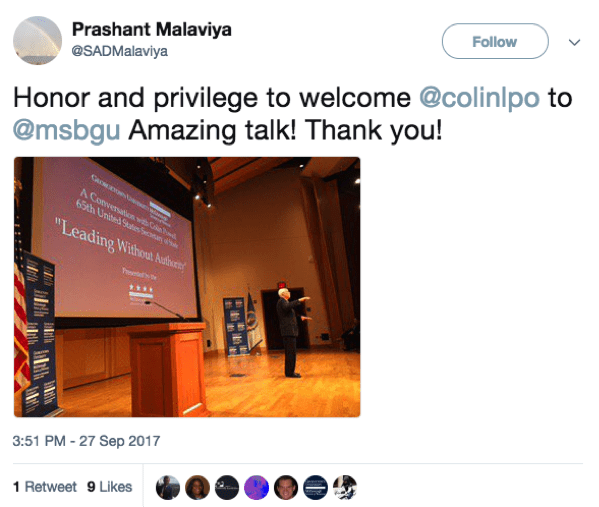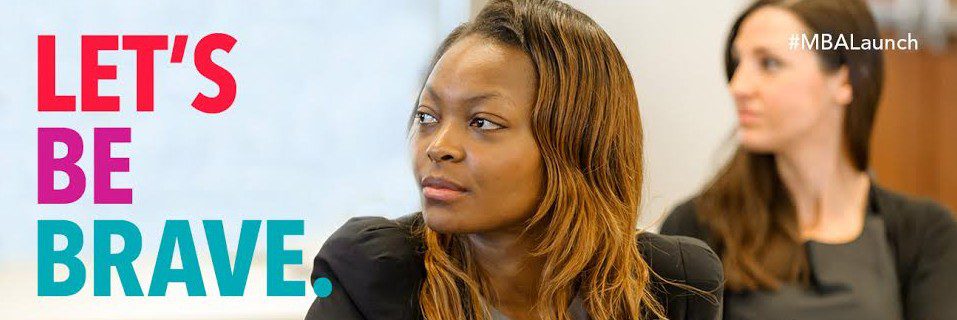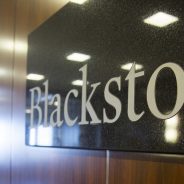Search results for :
3 Washington DC Nonprofit MBA Programs You Need To Know
It’s fair to say that the finance and consulting industries are the most popular for business school grads. But what about non-profits and social enterprises—where do they rank? While some assume that an MBA and working for a nonprofit do not go hand-in-hand, that’s not the case.
According to Fast Company, the nonprofit sector is the third-largest segment of the U.S. workforce, employing more than 13.7 million people at 1.8 million organizations, accounting for 10 percent of the country’s total workforce. The sector is the seventh-largest economy in the world—with combined assets of nearly $3 trillion, the U.S. nonprofit sector is larger than the economies of Brazil and Russia, and its neighbor to the north is taking notice. According to Nonprofit HR, in 2015, 50 percent of nonprofits were hiring compared to just 34 percent of for-profits. Nonprofit wages have also increased by 29 percent between 2000-10 and continue to rise, and exciting jobs in the sector are perfect for MBAs.
Some schools run entire centers and initiatives dedicated to the idea of social change. Other schools offer social entrepreneurship coursework, concentrations and graduate certificates with their MBA program. Here’s our rundown of three nonprofit MBAs in the Washington DC metro.
George Washington University School of Business
Students enrolled in the GWSB MBA program may combine their advanced business degree with a graduate-level certificate. One certificate program offered by the school is the Graduate Certificate in Nonprofit Management. This program is intended for students hoping to advance their careers in the nonprofit sector, as well as students who want to expand their knowledge but who do not want to commit to a master’s degree program.
The certificate requires that students complete 12 credit hours and maintain at least a 3.0 grade point average in order to be awarded the Graduate Certificate. Sample coursework includes:
- PPPA 6031 – Governing and Managing Nonprofit Organizations
- PPPA 6032 – Managing Fund Raising and Philanthropy
- PPPA 6016 – Public and Nonprofit Program Evaluation
- PPPA 6033 – Nonprofit Enterprise
- PPPA 6034 – Managing Nonprofit Boards
- PPPA 6053 – Financial Management for Public, Nonprofit, and Health Organizations
- PPPA 6058 – International Development NGO Management
The Graduate Certificate in Nonprofit Management program is available at the George Washington University’s main campus in downtown Washington DC.. Certificate students enroll in regular courses of the Trachtenberg School and earn graduate credit. Regular graduate tuition and fees apply.
Kogod School of Business – American University
The Kogod School of Business at American University also offers a Graduate Certificate in Nonprofit Management. According to the school, the certificate provides those currently working in the nonprofit sector a program combining both academic rigor and skill set training to enhance their performance in this growing work sector, as well as a foundation for master’s degree students about to enter the field.
The certificate program requires 18 credit hours of approved coursework with at least 9 credit hours at or above the 600-level and encompasses course offerings from the School of Public Affairs, the Kogod School of Business, and the School of Communication, as well as select coursework from the School of International Service and the College of Arts and Sciences.
Sample coursework includes:
- ACCT-607 – Financial Accounting
- FIN-630 – Financial Analysis of the Firm: Concepts and Applications
- COMM-642 – Strategic Communication Management
- MGMT-609 – Management of Organizations and Human Capital
- MGMT-633 – Leading People and Organizations
- PUAD-681 – Managing Nonprofit Organizations
University of Maryland R.H. Smith School of Business
The UMD Smith Dingman Center of Entrepreneurship and Center for Social Value Creation offer several different venues and opportunities for students to explore social entrepreneurship. According to the school, the Center for Social Value Creation was founded in 2009 and aims to educate, engage and empower Smith students to employ business principles that help not just the bottom line, but also the world. You can learn more about the UMD Smith Center for Social Value Creation here.
Students can pitch business ideas with a social mission through the Center’s Pitch Dingman program, or receive support and resources for their own social enterprises. The Center for Social Value Creation offers graduate coursework in social entrepreneurship at both the undergraduate and graduate levels, and leads Social Innovation Fellows, a one-year program that gives Smith School undergraduate students hands-on opportunities to seek innovative solutions for social and environmental challenges through the application of business principles.
To learn more about using your MBA for a nonprofit career, take a look at our “Should MBAs Work in the Nonprofit Sector” post. Check out our list of the top 10 nonprofit MBA programs in the country for even more options and information.
Hiring Practices Examined in New UMD Smith Research
Did you know that about half of job openings go to friends and acquaintances of high-powered individuals within an organization? We’ve always been told it’s about who you know, not what you know, after all.
Yes, referral-based hiring come across as a little sketchy, but many human resource departments actually encourage the strategy. But despite that, a research paper co-written by two Robert H. Smith School of Business scholars shows that hiring managers invite harsh moral judgments when they give jobs to friends and acquaintances referred to them.
Entitled “Compromised Ethics in Hiring Processes? How Referrers’ Power Affects Employees’ Reactions to Referral Practices,” the author’s note; “When the referrer is powerful, observers will believe the hiring manager is attempting to increase the referrer’s dependence on him/her, ultimately resulting in future benefits for the hiring manager.”
The research was authored by UMD Smith professor Rellie Derfler-Rozin, Ph.D. candidate Bradford Baker, and Harvard Business School professor Francesca Gino and published in the Academy of Management Journal. They found that hiring managers appear self-serving and unethical to others in the organization, which can disrupt workplace chemistry and even hurt support for the new hire.
“Referral practices can be seen as morally murky territory in which special interests and the exchange of favors dominate, above and beyond merit,” the authors wrote.
However, they also found that referral-based hiring practices have advantages: Not only do referrers usually have inside information about the applicants they recommend, but they also have incentives to train, mentor, and monitor them as well. Additionally, new hires want to perform well so they don’t embarrass the referrers who put trust in them.
Ultimately, the research does not suggest that companies should stop referral-based hiring, but that hiring managers and the people who give referrals should be mindful of the power dynamics involved.
“One suggestion could be creating a system in which referrers are anonymous, at least for an initial period of time pre and post-hire, while simultaneously providing enhanced transparency regarding the reasons for the referral,” the authors write.
You can read the entire research paper “Compromised Ethics in Hiring Processes? How Referrers’ Power Affects Employees’ Reactions to Referral Practices” here.
What Is The Worst MBA Advice You Have Ever Heard?
The path to business school is paved with experts and know-nothing-know-it-alls alike—it’s just hard to tell the difference sometimes.
This is especially true when it comes to “dos” and “don’ts” of the trade. You’re bound to encounter confusing, conflicting, or just plain bad advice in any field but there’s something about business school that seems to attract meaningless jargon like flies to honey.
I spoke to Accepted’s Linda Abraham and North Star Admissions’ Karen Marks, two leading admissions counselors and bonafide MBA experts, about the eight worst pieces of advice most commonly doled out to MBAs-to-be.
“Tell them what they want to hear.”
“The admissions committee will see through it, the applicant will blend into the gray mass of applicants who are making the same mistake, and at competitive schools, will get dinged,” Abraham writes. “Telling schools what you think they want to hear means telling them what you don’t know, and it also means you’re not telling them what you want them to know.”
“If you are waitlisted, ignore the school’s directions and make a dramatic gesture to demonstrate your interest.”
According to Marks, “People … have been known to do everything from emailing the admissions office once a day (relatively benign, but inappropriate) to sending homemade gifts (creepy) to showing up in the admissions office and refusing to leave until they have spoken with the Dean. All of this backfires, it’s really important to listen to the school’s directions and express your interest in ways that underscore your ability to follow directions, and your understanding of the culture.”
“Change your career goals and personal story for each school.”
Marks explains, “Your goals and core narrative should remain constant, no matter what school you are applying to. Don’t tell Stanford that you want to work in micro-finance and Kellogg that you dream of marketing, just because you think it’s what they want to hear.”
Abraham recalls an interaction she had with “an applicant who came to us initially for Rejection Review.” This applicant was told by his consultant, a former Yale SOM adcom director, “she would have rejected him also because the applicant’s goal made no sense given his work experience, education and extra-curricular activities. He explained that his friends had told him to use the “hot” goal that year, so he used it in his application. Next year he applied with an authentic goal (and app) and was accepted to an M7 school.”
“You have no chance of getting into a top MBA program because you didn’t go to a top undergrad.”
Abraham couldn’t disagree more with this statement.
“If an applicant excelled at their local college, shows leadership, and has had an impactful career, and has a competitive test score, they have a chance at elite MBA programs,” she says.
“You have a 750-plus GMAT and a 3.9 GPA, you’re in anywhere.”
Both counselors call hogwash on this one.
“You can’t rest on academic laurels. Yes, those numbers are very attractive to top b-schools, but if they are combined with arrogance—forget it. Schools also want to see leadership and impact in their accepted students. So, if Super Student wasn’t a super employee or entrepreneur or campus community member, those stats do not guarantee acceptance at top MBA programs.”
“Your goals don’t really matter, because you’re likely to change them once at b-school.”
Abraham writes, “Yes, your goals are likely to change and schools know that, but they at least want you to start their program with direction and a goal they know they can help you achieve. Goals are a major component in fit at most top MBA programs. And if yours are vague or don’t match the strengths of your target schools, then you simply aren’t showing fit.”
“If you have a blind interview, you can wing it.”
“You can wing it. BUT you are unlikely to be as effective as the other applicants who prepare,” Abraham notes.
“They will have researched the school, know exactly why they want to attend this program, and mined their own experiences and achievements so they are ready to show they belong at the interviewing school and will contribute to the school’s student body and alumni network.”
“Oh, and they also have thoughtful questions to ask the interviewer.”
“You won’t get in if your numbers are below an arbitrary number, so don’t even bother applying.”
Abraham has worked with “multiple clients who had extremely low GMATs and GPAs, below 2.5 and below 600, who have been admitted to Wharton, Booth, HBS, etc. I also admitted applicants with weak numeric profiles to Tuck when I was the Associate Director of Admissions. (They had other stellar qualities).”
Abraham believes that “essays, personality, perspective and life experience are more important than numbers.” She adds, “Application reviews are comprehensive. One element is extremely unlikely to keep you out or carry you across the threshold of a dream MBA program.”
Online MBA Programs That Don’t Require the GMAT or GRE

Why Do Schools Require the GMAT?
Similar to how the SAT plays a role in undergraduate admission to higher education, the GMAT has been a consistent requirement for the majority of business programs globally. This standardized test has been one of a variety of factors that go into consideration when being accepted into programs. There are three main reasons that the GMAT has been part of the application process:
- Reliable indicator of student success: Based on surveys conducted by GMAC, the GMAT has been a reliable indicator of student success in the classroom among MBA programs.
- Equalizer in admission process to gauge quality of prospective students: The GMAT also provides a standardized test, which is applicable to all students entering admissions to top MBA programs. Other factors such as years of work experience and undergraduate GPA are subjective and can vary depending on the applicant.
- Major factor in many major MBA rankings: Major publication rankings such as the Financial Times, US News and BusinessWeek take into consideration the average GMAT score for each MBA programs incoming class. For example, the mean GMAT and GRE score is weighted at 0.1625% for the US News Ranking. Historically, schools have an incentive to accept students with higher GMAT scored for ranking purposes in these major publication rankings.
Why Pursue an Online MBA?
There are many reasons to pursue an online MBA degree versus a full-time on-site MBA or a part-time on-site MBA:
- Advancement in technology: The advancement in technology platforms, schools are increasingly able to provide an in-person atmosphere at remote locations for students. For example, many colleges utilize a web platform called ClassroomLIVE, which is an integrated, web-based learning environment that delivers programs in real-time from classrooms on college campus’s direct to students, in their homes, at their workplaces, or while traveling. This provides a synchronous learning opportunity where students are able to interact live with professors and other students during the class as it is taking place on campus. Take a look at an example of the interactive learning platform here.
- More accepted among employers: The stigma among corporate recruiters and hiring mangers when it came to online MBA job seekers was that it was not as respected compared to on-campus MBA offerings. However, with the online MBA becoming more popular among degree seekers, corporate recruiters and hiring managers are weighing the name of your college and the type of degree you have earned is more heavily than the method by which you earned your degree.
- Flexibility: One of the major issues facing MBA degree seekers is balancing their current career or family obligations while also being able to complete an MBA and the learning requirements. Many part-time programs are offered at specific locations on specific days, creating a barrier for applicants to pursue the degree offering. One of the major advantages of pursuing an online MBA program is the flexibility the learning experience offers. Many programs are beginning to offer students the option to attend the classroom learning in person, but not penalizing them for accessing the curriculum remotely.
- Lower cost on average: Since the overhead cost are lower for colleges and universities, online MBA programs are typically cheaper than on-site program offerings. This is another advantage for students who are looking to complete a flexible MBA degree at a lower cost. On average, online MBA programs are about 15-20% cheaper than an on-site offering due to the lower overhead.
What Factors Should I Consider for Choosing an Online MBA?
- Network of professors and faculty: The professors and faculty in your MBA program are one of the most important facilitators as you learn the curriculum of an MBA. Professors have in-depth knowledge of business practices as they apply to the real world and the best ones can challenge you to apply the skills you learn throughout your MBA to real-life scenarios to prepare you as a business professional. It is important to understand your professors background and experience and how it will impact their teaching style and expertise.
- Network in the classroom: Although professors and faculty will steer high-level learning, your classmates will have a large impact on your classroom discussions, projects and case studies. Learning from experienced individuals will provide more value and insight throughout your MBA. It is important to prioritize the level of quality among your classmates to enhance your learning experience during your online MBA.
- Alumni network: One of the most important assets an MBA program can provide is its inclusion to a wide range of alumni from CEO’s and CFO’s of Fortune 500 companies to presidents and general Managers of global corporations. It is important as you consider the quality of the MBA program, that you also heavily factor in the alumni network that each institution provides to its newly dubbed alumni. These networks open doors to employment and internship opportunities post-graduation.
- Internship opportunities: Many MBA programs offer internship opportunities during your educational experience. MBA internships allow you to get your foot in the door while directly applying the knowledge and skills you gained during your MBA. It is also important to research the career services office to see where previous MBA students have interned to make sure the opportunities fit your goals.
What are the General Requirements of Online MBA Programs that Do Not Require the GMAT?
For applicants who are looking to bypass the GMAT and pursue an MBA that does not require the GMAT, there still are requirements to be eligible for admissions to many online MBA programs, they include:
- Schools application
- Bachelor’s degree
- Resume
- Letters of Recommendation
- Personal Statement
- Application Fee
Why Pursue an Online MBA That Does Not Require the GMAT or Offers a GMAT Waiver?
One of the main reasons applicants should consider pursuing an online MBA program that does not require the GMAT is because it allows applicants to receive an admissions decision without having to study for and take the GMAT. With this barrier removed, applicants are more likely to apply to MBA programs and schools are finding other requirements to ensure programs still maintain high-caliber students.
Below is a List of MBA Programs That Don’t Require the GMAT or GRE. For a Complete List of MBA Programs in the Online Metro, see our Online MBA Region Overview.
Click on a program profile below to see if you meet the eligibility requirements for that program.
 Loading Programs
Loading Programs
Verizon is on the Lookout for MBA Students and Grads
Telecom giant Verizon Communications provides wireless and wired telephone, internet and television service, in addition to cloud-based services to businesses. One of the largest wireless service providers in the United States, and among the largest communications technology companies in the world, Verizon employs nearly 200,000 employees—including a large number of MBAs.
Working at Verizon
Working at Verizon has its perks. In addition to competitive salaries and performance-based incentives, benefits include 401(k) savings with company match and discounts on Verizon products. Some Verizon offices also feature in-house gyms, or discounted gym memberships. The company is also committed to lifelong learning, providing training, development, and tuition assistance
Other worthy benefits Verizon employees can take advantage of include:
- Adoption expense assistance
- A matching gifts program
- Military discounts
- Employee Relief Fund for victims of natural disasters
- Best-in-class health and insurance benefits
- Healthy Pregnancy Program for expectant mothers
Verizon was also recently recognized as the top company for diversity leadership by Diversity MBA Magazine.
“Being good at diversity and inclusion is not an option at Verizon. With more than 180,000 employees serving customers in more than 2,700 cities spanning more than 150 countries, Verizon is privileged to serve a very vibrant and diverse marketplace,” said Magda Yrizarry, Verizon Chief Talent and Diversity Officer.
“Being successful with a customer base like this is not possible without a diversity of people, ideas, and experiences,” Yrizarry added.
According to Diversity MBA Magazine, Verizon recruiters maintain close relationships with organizations like the Society of Women Engineers, the National Society of Black Engineers, and Hispanic Business Students and Professionals. The company also has a fantastic track record of hiring women and minorities, with women and people of color making up about 60 percent of the company’s board of directors, while women specifically make up 37 percent of senior management.
Verizon was also one of the first major companies to offer benefits to same-sex couples in domestic partnerships and provide free preventative care services to women, such as on-site mammography screenings. The company is also well-known for its practice of recruiting veterans.
“Verizon is a diverse company in its people, ideas, services, and the communities it serves,” Yrizarry said. “Our workplace culture ensures that everyone, no matter their ethnicity or background, has opportunities to contribute to the solutions required to stay relevant and competitive in the marketplace, grow professionally and advance their career.”
Joining the Verizon Team
Verizon offers a number of internships and MBA Leadership Developmental Programs to graduate business students. According to MBA Exchange, these programs offer MBAs a first-hand rotational learning experience focused in different aspects of the company. With so many different paths and career opportunities at the company, these programs are an opportunity to build strong leadership skills in a particular division of Verizon.
MBA opportunities include:
- Marketing MBA Internship
- MBA Business Transformation Internship
- MBA Finance Leadership Developmental Program
- MBA Marketing Leadership Developmental Program
- MBA Product Management and Strategy Internship
- Supply Chain MBA Internship
What Are These Jobs Like?
Let’s take a look at some of these Leadership Developmental Programs. The Supply Chain MBA Leadership Development Program is a two-year rotational program designed to develop future Supply Chain leaders at Verizon. MBAs work on projects that develop skills in supply chain, operations, strategic planning, and sustainability. Students in the Supply Chain MBA Leadership Development Program may be assigned to any of the following focus areas:
- Supplier Management
- Strategic Supply Chain Planning
- Inventory Management and Logistics
Meanwhile, the Marketing MBA Leadership Development Program challenges business students with high-impact projects that develop their skills in branding, product management, and marketing strategy. The two year rotational program is designed to develop skills in:
- Business or consumer product management
- Marketing strategy
- Marketing operations
- Branding
- Promotions
Who is Verizon Looking For in New Hires?
Verizon specifically states the type of candidates they are looking for in various job descriptions on the web. These jobs call for “a motivated self-starter” who is “never satisfied with the status quo.” The telecom giant seeks candidates who are always trying to beat a personal best and thrive in fast-paced environments where new challenges come up every day. Prospective hires should be flexible, dependable, and work well in varying environments.
It’s also a plus if any MBA internship candidate has:
- Proven record of academic, professional and leadership achievement
- Excellent organizational, analytical and critical thinking skills
- Strong quantitative and technical skills
- Great verbal, written, communication and presentation skills
- Proficiency with Microsoft Office Suite
You can find more Verizon job opportunities here.
Why The Blackstone Group Loves MBA Grads
It’s no secret that pursuing an MBA can help business professionals to open new career opportunities, boost their earning potential, and accelerate their careers. And for those employers that deeply understand the value of an MBA education, these sorts of benefits can be hardwired into a company’s DNA.
At a firm like the Blackstone Group, hiring and using the skills of MBA graduates to improve the company is just part of doing business. In fact, for many of the top investment banking firms in the United States, an MBA is pretty much a requirement for advancement. During a 2015 Korn Ferry executive search for a senior-level investment banker at a top firm, just two of the twenty five top candidates did not possess an MBA.
What is Blackstone?
The Blackstone Group is one of the world’s leading investment firms, with more than 2,300 employees in 25 offices throughout the globe. Founded in 1985 by Chairman and CEO Stephen A. Schwarzman and former Senior Chairman Peter G. Peterson, Blackstone aims to create a positive economic impact and long-term value not just for the companies and investors involved with the firm, but also for the communities in which they are involved.
As of September 2017, Blackstone has $387 assets under management, which include private equity, real estate, credit, and hedge fund solutions.
Why MBAs Love Blackstone
Blackstone is consistently named among the top MBA employers in the country, and it’s pretty clear why: in addition to a high earning potential, the company is well-known for providing autonomy and opportunity early on in a new associate’s career.
“New hires can expect to take on client-facing roles that make them an integral part of the company’s decision-making right away,” said Bronwen Baumgarder, who runs the company’s MBA recruiting program.
MBA degree or no, its clear that Blackstone provides an excellent work environment for its employees. Ranked “Best Place to Work” for three years in a row by Pensions & Investments, Blackstone considers its employees as an integral part of the firm’s identity and culture of integrity. Blackstone also offers many opportunities for both undergraduate and graduate business students to get involved while still in school—through summer internships and even full-time positions—making the firm an ideal place to start your career.
YOU MAY ALSO LIKE: What Should You Study? Finance Vs. Accounting MBA
Life at Blackstone
Graduate students may apply to join Blackstone’s full-time program starting in their second year of business school. Starting in August, the company sponsors recruiting events on university campuses throughout the globe, and students may begin applying for a number of available positions within the company.
The full-time program at Blackstone is open for candidates interested in a full-time role as an analyst or associate. Candidates may apply for multiple groups within the vast company, but MBAs are typically placed within the firm’s restructuring, advisory or private equity businesses. Other possible groups within the company include:
- Charitable Foundation
- Equity Healthcare
- Finance/Accounting
- External Relations & Strategy
- Investor Relations/Marketing
Landing a Job at Blackstone
Although Blackstone actively recruits MBA candidates throughout the world, securing a position with this top firm is still highly competitive. Each year, the company typically hires eight to twelve full-time MBAs, which is only a small percentage of the total employee base of more than 1,600. While the full-time program is an excellent way for business students to get involved early, summer internships are another way for talented students to get their foot-in-the-door early in the recruitment process.
The summer internship is a unique experience, typically lasting 10-12 weeks and aimed at students in their first year of business school. The summer interns at Blackstone do a lot more than get coffee—summer analysts and associates are considered an integral part of all deals, transactions and projects throughout the summer. In 2012, thirteen summer interns were hired full-time from top business schools around the country.
First and foremost, the firm seeks talented individuals who demonstrate strong leadership skills and the potential to grow with the company.
“Our corporate culture is very important and we have very little turnover,” Baumgardner told CNN Money. “[S]o longevity is very important to us.”
How Boston Business Schools Help Low-Income MBA Applicants
Anyone planning on earning a postgraduate business degree knows that MBA programs cost a lot of money. In the Boston metro, where the cost of living is already high, the annual cost of an MBA program can reach upward of $100,000 … Ouch! Continue reading…
Online MBA
Hough Graduate School of Business Online MBA Structure
The University of Florida Hough Graduate School of Business offers two Online MBA options through its Hough Graduate School of Business. The One-Year Online MBA program is designed for students who have earned a business undergraduate degree in the past seven years. The Two-Year Online MBA is offered to candidates from any academic background or those who earned a bachelor’s in business more than seven years ago. The two-year program includes more core business requirements since its students will not necessarily have covered fundamentals in their earlier education or will benefit from a refresher.
Curriculum
The One Year Online MBA is comprised of 32 credits. Candidates can start in early January, September, or April. The year begins with a required orientation in Gainesville on the University of Florida campus. This is followed by a required week-long Foundations Review—a refresher on core business concepts. While lectures and coursework are completed online, students are required to attend weekend residencies every four months. The school notes that exams will likely be administered on Saturdays, while Sundays are dedicated to meeting with new faculty for the upcoming term. With regard to class structure, the one-year online MBA is cohort-based. Students work with the same cohort in the first five terms of their studies. The time to complete the program is 16 months (12 months for accelerated students)
After completing the first five terms, One Year Online MBA students choose four electives for their sixth term. These electives can be selected from four areas of focus: entrepreneurship, finance, marketing, and international. Students also have flexibility in how they take these electives. They can continue to take the courses online over the course of four months, as they did in the first five terms. Alternatively, they can choose to complete their elective courses on campus in Gainesville over the course of an intensive week. Finally, an international trip, called a Global Immersion Experience, lets students fulfill an elective requirement for the International Focus Area. Recent destinations for the Global Immersion Experience have included Argentina, Brazil, United Arab Emirates, Ireland, and China. Time needed to complete the program is 27 months.
The Two Year Online MBA is comprised of 48 credits. The 16 additional credits beyond the one-year online MBA allow students to complete additional core requirements in finance, marketing, management, and more. After core requirements are met, the two-year online MBA mirrors the one-year online program in the sixth term. Participants in the two-year program can select from the same four focus areas for their electives as the one-year program and can choose to complete them in the same ways—either online or in an intensive week-long session on campus. Students can start the two-year online MBA in late January, May or late August.
The recently-added 24-month traditional Online MBA is comprised of six total terms, each taught in five-week modules. The total number of credits needed to complete the program is 48. After the initial three terms, students in the program are given the option to substitute courses with “residency elective course or Global Immersion Experience (GIE)” and A “Global Business Concepts (online module).”
Online MBA Rankings
• U.S. News & World Report: 3
• Financial Times: 4
Class Profile
Students, on average, enroll with a 600 GMAT score, a 3.3 undergraduate GPA, and roughly 6 years of previous work experience. The average age is 28. Approximately 65 of the 456 students (about 14 percent) of the class is comprised of active military members and veterans. Around 27 percent of students in the programs are of minority status, with 7 percent international students. The average individual class size is 47 students.
Tuition, Scholarships, and Financial Aid
The Florida One-Year Online MBA currently costs $49,205 including fees, while the Two-Year Online MBA costs $59,807.20. In addition to Federal Direct Unsubsidized Loans and private loans, graduate students can also seek Federal Direct PLUS Loans to cover the expense of their education. Those not eligible for Federal loans may also consider loans directly from the University of Florida. All candidates are considered for merit-based scholarships when their applications are reviewed. Scholarships may be based on work experience, academic performance, leadership, and other accomplishments.
Admissions
The Hough Admissions Committee reviews online MBA applications on a rolling basis. Those interested in pursuing an Online MBA from the University of Florida must complete the online application. Interviews are not required for the online MBA programs, but candidates may request one. There are seven steps to the process of applying for an online MBA at the University of Florida: register to apply, complete an Office of Admissions application, complete an MBA Supplemental application, email résumé, send official transcripts, submit two letters of recommendation, and send relevant test scores. The University of Florida prefers GMAT scores but will accept the GRE. Applicants with a doctoral/professional/terminal degree may be exempt from the GMAT requirement. International applicants must submit GMAT scores, not GRE scores, and depending on their English skills, they may also be required to provide a TOEFL/IELTS/MELAB score.
2021-2022 Florida Online MBA Deadlines
| Admission Term | Apply By | Orientation* | Classes Start |
|---|---|---|---|
| Fall | Jun 1, 2022 | Aug 12-13, 2022 | Aug 14, 2022 |
| Spring | Dec 1, 2021 | Jan 28-29, 2022 | Jan 28, 2022 |
| Summer | Mar 1, 2022 | May 13-14, 2022 | May 15, 2022 |
Florida Online MBA FAQ’s
How has the university handled the pandemic?
All classes and gatherings are virtual.
What MS programs are offered at UF?
There are several MS programs (including online options) in management, entrepreneurship, and international business.
How many hours a week can students expect to be spending on schoolwork?
With asynchronous as well as synchronous class formats students can expect flexibility while working their MBA into their schedules. In fact, MBA candidates in the two-year program should expect only about 15 hours/week to complete coursework.
How To Avoid Costly MBA Résumé Mistakes
Submitting a résumé is perhaps the most crucial part of every prospective MBA’s application process. A good résumé provides insight into who an applicant is, and what they’ve accomplished. A well-crafted, attention-grabbing résumé that captivates an admissions team can bring an applicant much closer to an acceptance letter.
But aside from a name, contact info, and educational and professional details, what should a slam-dunk MBA resume include?
What Are The Résumé Basics?
Starting with the principle basics, résumés should be short, sweet, and concise. Ideally, they should fit on one page—maybe two. Stephan Kolodiy, an admissions officer at Rutgers University, told U.S. News & World Report that long résumés are a common issue with many MBA applicants.
“Sometime we get a résumé that’s five to six pages long, and that’s way too much information,” he says.
That one-to-two pages of concise information should also be 100 percent accurate—one should never lie on a résumé. Because credibility plays a big role in the application process (MBA or otherwise), it is unwise to fabricate work or school experience. Deceitful, even exaggerated, résumés are always rejected by business schools, and admitted students who submit compromised résumés are at risk for expulsion. This is serious stuff, so don’t lie!
Carrie Marcinkevage, MBA Managing Director at the Smeal College of Business at Penn State University, told U.S. News that honesty is always the best policy.
“Authenticity allows you to find the right school and that school to find you,” Marcinkevage says. “Allow them the chance to find the real you.”
Perhaps most importantly, all MBA résumés should provide examples of success. Prospective MBAs should give admissions officers a reason to send an acceptance letter by showing concrete examples of career advancement, or of how an MBA candidate achieved results for a particular client.
“When applying to a top-tier business school, you’ll need to show admissions committee on a clear path of professional growth,” U.S. News reports.
What Are You Forgetting?
There are also some not-so-basic guidelines that MBAs are encouraged to follow when crafting a solid résumé. Investopedia published a guide reviewing some of the best resumes for MBA applicants that outlines a few tips that many prospective business students may not have previously thought of.
Without sounding like too much of a graphic design nerd, it’s important to take typeface into account with a résumé. Yes, fonts matter. It’s best practice to rely on on two typefaces: A bold sans-serif face for headers, and a standard serif face for body type. For those of you who don’t know, a serif is the tiny extension on the termination point of an individual letter, the little “hat” at the end of a letter if you will.
Serifs exist to make smaller text easier to read, so they are the best friend of admissions offices who may read hundreds of résumés per day. Sans-serif fonts—letters that don’t include serifs—are cleaner and pop easier when bolded out. Résumés should avoid using fonts that are too common, such as Times New Roman, but also avoid ridiculous fonts like Comic Sans. Nobody likes Comic Sans.
Aside from listing relevant work experience, and showing how much growth took place at each job, there are other skills that every résumé should highlight. According to U.S. News, the three skills that can best help sell an MBA applicants résumé to a business school are:
-
- Leadership
- Communication
- Innovation
First and foremost, business schools want to see strong leadership skills as well as personal growth. All MBA programs focus on developing management skills, but schools wants to know that a solid foundation of leadership is already there. Good résumés provide evidence of an applicant motivating a team behind a common goal, figuring out the best use of other’s talents and skills, instilling a concrete vision, and prioritizing the needs of an organization above personal needs.
As for communication, a résumé is an applicant’s first line of communication to a business school, and should be chock-full of structured writing and thought-out word choice. U.S. News shows the different between a boring resume and beautifully worded one:
“Here’s a real example of a blah bullet point in a client’s first draft: ‘Helped with new software implementation.’
Now, a brilliant bullet point: ”Spearheaded software upgrade in the San Francisco field office by coordinating with software developer, leading training sessions, and facilitating implementation schedule.’ The second example offers a much more comprehensive understanding of the scope of the accomplishment.”
Some applicants may try to hard to impress admissions officers with technical jargon or fancy terminology. Lose it, and show that you can clearly, and simply explain headier topics in writing:
“One client listed this bullet point on his resume: ‘Created VA1 Business Acquisition.’
Once we translated that into something the MBA admissions audience would understand, the résumé said: ‘Devised and launched outbound communications plan for our premier voice activated product. Product was well received and became cash flow positive within 14 months.’
Much better.”
Lastly, a résumé that shows an applicant has helped innovate will go a long way. This piece of advice is especially handy for applicants with traditional pre-MBA jobs. All admissions officers know what a consultant or analyst is tasked with at an entry-level position. A resume is an opportunity to shed light on things that sets an applicant apart from other typical analysts. Things to keep in mind include: training a newly hired analyst, leading college recruiting efforts, or organizing an office volunteering or fundraising initiative.
Avoiding Deceptive Mistakes
Now, here’s where we can get a little dramatic: Résumés are the first impressions a prospective MBA job candidates has with a potential employer. Since no one gets a second chance to make that first impression, don’t mess it up!
Bloomberg issued a list of the “Ten Biggest Resume Blunders” that outlines exactly what not to do with an application résumé, which includes obvious items like avoid writing a bad cover letter and remove foolish typos and inconsistencies.
The list also features some gems, like how to avoid making your résumé a cluttered mess. Again, not to sound like a graphic design professor, but the look of a résumé certainly counts. Avoid using fancy graphics or designs, and provide a crisp, clean document that’s easy to read on a computer screen.
“The résumé should be presentable, not an information dump,” Chris Thomas, Global Recruiting Director of the Experienced Commercial Leadership Program at General Electric, told Bloomberg. “There should be some white space.”
A well-done résumé shouldn’t misfire on any points—bullet points, that is. Some schools offer formats for resumes, specifically on how to list past job experience. Schools like the University of Michigan Ross School of Business advise students to use the “Action Context Result” format, which describes an action they performed, where they performed it, and the results it garnered.
“‘Worked for XYZ Corp., 2008 to 2012’ says close to nothing,” Damian Zikakis, Director of Career Services at Ross, told Bloomberg. “’Led a review of supplier contracts for the technology division resulting in savings of $250,000 opens doors.”
Lastly, a résumé should never disregard an applicant’s worth, nor should it overshare information. As we mentioned earlier in this piece, a good résumé should demonstrate what an applicant has accomplished and what they can bring to a new employer. It should not feature information that, even if positive, is irrelevant to a desired position.
“Think of the résumé as a future-focused document and not an historical one,” Char Bennington, Director of Career Management at the University of Chicago’s Booth School of Business, told Bloomberg. “Focus on what’s important to the people in the career that you want now.”
How Else Can Your Résumé Stand Out?
To help make sure a résumé stands out in the crowd, consider participating in some relevant volunteer work. David D. Schein, the Director of Graduate Programs for the Cameron School of Business at the University of St. Thomas, told MetroMBA that adding volunteer work to a résumé. With that said, not all volunteer work is equal.
For example, if you volunteer at the SPCA and play with puppies all day, that probably won’t your résumé or your application. Instead, find “responsible positions that deliver a lot of bang for the time commitment,” Schein says. Find a position that will allow you to spend time organizing a major fund-raising activity or event. It should be something that has a demonstrative impact on the organization and illustrates your leadership potential.
Including unique and interesting hobbies can also be a fun way to illustrate your skills and stand out. Schein recommends that applicants choose hobbies that “demonstrate drive and ambition. Some examples might include white water rafting or learning a difficult foreign language like Chinese or Farsi.”
Admissions Tip: Top 5 MBA Interview Questions
Interviews, interviews, interviews … it’s all anyone seems to be talking about these days, and with good reason. Wharton is scheduled to release its interview decisions tomorrow, Harvard Business School has already sent its invitations out, as have many other top schools.
Instead of driving yourself crazy with worry, why not buckle down and perfect your answers to the questions you are most likely to be asked? To help you prepare, Clear Admit has prepared Interview Guides and Interview Archive to compile its very own Top Five list of the questions that most often make their way into MBA admissions interviews at leading schools.
While these refer primarily to questions asked as part of blind interviews, they can certainly also come up as part of non-blind interviews. In those cases, you’ll want to be prepared to go deeper into some of the specific experiences you shared in your application. For a quick refresher on the difference between blind and non-blind interviews, click here.
For detailed insights into each school’s interview process, the questions they ask, and how to tackle those questions, access Clear Admit’s Interview Guides.
Top Five MBA Admissions Interview Questions
Walk me through your résumé.
The real trick with answering this open-ended question is to gauge how much detail is too much. Imposing a structure can help. “It’s best to err on the side of brevity,” says Alex Brown, who asked this very question of many hopeful Wharton applicants during his time working in admissions at the Philadelphia school. “Think of this résumé walk-through as simply laying the groundwork for deeper discussion of your background and accomplishments.” A good idea is to develop a two- to three-minute run-through, beginning with where you grew up and went to college, what you studied and perhaps something you enjoy outside of work. Then move into a concise overview of your work experience, beginning with your first job and continuing to present day, making sure to explain why you made the choices you did and what you learned in each major role. “This kind of high-level overview gives your interviewer the perfect opportunity to ask for more detail about specific points if she wants it,” Brown says. If you have a gap of three or more months due to unemployment or some other cause, you should be prepared to address it, Brown warns, although in a short résumé question as part of the interview, it may not come up.
What are your career goals?
With any luck, you will already have a well-honed response to this question, developed and refined as part of the process of writing your application essays. “If you are looking to shift industry or function, this is your chance to explain your reasoning and that you have carefully thought through what may be involved in successfully making the transition,” Brown says. Keep in mind why the adcom is asking this question, Brown suggests. “They want to know how focused you are on the MBA and whether you are in a position to take advantage of the resources business school offers or at risk of getting overwhelmed,” he says. Present a very clear post-MBA goal, Brown recommends. “Schools prefer to admit students who can explain exactly what kind of job they want to pursue beyond graduation and articulate how it will set them up to obtain their long-term career objectives,” he says. Schools are also looking, with this question, to see if your goals make sense and are feasible in light of your past experiences; are you able to articulate a clear path and plan?
YOU MAY ALSO LIKE: No GMAT, No Problem
Why X school?
Here, schools want to see if you have really done your research on their program and whether you are a good fit with their culture. So, do your research. “I recommend a three-pronged approach to make a truly compelling case for your interest in a given school,” Brown says. Start with academics, he says, naming specific courses and professors that you are interested in. “Remember, your interviewer wants to see that you have really researched the school.” Second, mention specific clubs, conferences and other special programs that will help position you for your career goals. “Even better, show how you would contribute to the school community, such as by organizing an event to share specific knowledge you bring with your future classmates,” Brown suggests. Third, show that you have a good understanding of the school’s community, culture, class size and location and have thought about how these fit with your personality, goals and background. “If you have visited campus or talked with current students or alumni—definitely say so, lead with this.” Brown stresses. “Beyond showing that you’ve invested time in getting to know the school, this also helps your interviewer have a mental picture of you on campus.” he says.
Give us an example of a time you took a leadership role.
The way interviewers ask this question can vary—sometimes you’ll be asked directly about your most notable leadership experience and other times you’ll be invited to describe your general leadership style. “It’s important to keep a few basic principles about leadership in mind,” Brown says. “A leader is someone who has a strong vision or point of view and is able to see things others are not,” he continues. A leader must also have excellent communication skills. Choose an example that demonstrates these points. An ideal leadership example will describe a time when you negotiated with and persuaded key stakeholders, such as clients or a supervisor, to buy into your vision and then delegated the work and managed colleagues or juniors. “If you encountered obstacles along the way, share how you dealt with them,” Brown says. “If possible, you should also show success through quantified results,” he adds. As important as a successful outcome is demonstrating how you drew on the help of others where necessary. “No one is successful on their own,” Brown says. Show that you understand that strong leadership means teamwork and playing well with others, he says.
Tell us about a time you failed.
As tempting as it may be to say that you’ve never failed at anything…that is not what that adcom is looking for here. “In fact, this is a favorite question for those who appear to be ‘rock stars’ on paper,” Brown says. But rock stars make mistakes, and having an example in your back pocket of a time things did not go according to plan can show humility as well as your capacity to learn and grow. “The best answer to this type of question ends with a more recent experience where you took the lesson you learned from the failure and put it into play, affecting a better outcome.” he says.
These five questions certainly don’t cover everything your interviewer is likely to ask you, but they do touch upon some of the things you’re most likely to be called upon to share as part of your MBA admissions interview. You can take some of the anxiety out of the interview process by giving each one some thought, drawing on some relevant experiences from your past, and practicing the responses you would give. Don’t practice too much so that you appear overly rehearsed—since it’s important to seem both authentic and genuine—but prepare enough so that you’ll be ready to truly put your best self forward.
This article has been edited and republished with permissions from Clear Admit.
Our Favorite MBA Recruiters: Facebook
These days, it seems like everyone and their mother is on Facebook—no, really, your mom sent me a friend request last week. Your family vacation looked like a blast! As more and more people subscribe to the undisputed king of social media, Facebook seems to hire more and more MBAs to continue to move the company forward into the future. Continue reading…
Getting Your Money’s Worth: The Return on Investment of the Chicago MBA
Although a growing number of business schools throughout the country are offering part-time or Flex MBA programs, many ambitious business students still choose to pursue their education full-time. However, the often high price of tuition combined with two years of lost income can be a huge deterrent in students choosing a full-time MBA program.
Although the thought of taking two years off from a career may be daunting—especially when it comes to a quickly growing city like Chicago—prospective MBAs should also keep in consideration one of the benefits of having an advanced degree: a salary bump. Considering this, students can better evaluate the true return on investment (ROI) program full-time MBA and make smart decisions about where their money will go farthest.
Don’t let the high price tags of MBA programs in a major business city Chicago scare you away. Below are the Chicago business schools that offer students the best ROI.
Kellogg School of Management – Northwestern University
Northwestern University’s Kellogg School of Management boasts one of the highest ROI’s in the world, ranking fourth overall among the world’s best business schools on Forbes recently released list of the best full-time MBA programs in the U.S. Forbes‘ ranking is weighted specifically by how well compensated graduates are several years after earning an MBA.
Forbes ranking notes that 2012 MBA graduates are now making an average of $84,800 in their return on investment. While several business schools will often have a higher-level of compensation for in-state residents because of tuition differences, Kellogg tuition rates remain constant for both in and-out-of-state applicants. On average, students earn around $80,000 per year prior to enrollment, which increased to an astounding average of $196,000 just last year. Most grads pay their entire tuition back less than four years after graduating.
YOU MAY ALSO LIKE: Kellogg Launches 10 New Courses
Booth School of Business – The University of Chicago
In 2016, the Booth School of Business at the University of Chicago topped the ValueWalk list for having the highest return on investment in the world. Comparing the relatively low cost of a Booth MBA (around $65,000-70,000) with graduate salaries of up to $150,000 or more, Booth graduates will have paid for their degree twice over by the time they have completed their first year of work. Booth graduates are also likely to find work quickly—within three months of graduation, 98.4 percent of all MBA graduates had secured job offers. Booth alumni also find many of their post-graduate opportunities through a broad network of alumni and career support at the university. In 2016, the university was responsible for facilitating 75.2 percent of student’s new jobs.
Lake Forest Graduate School of Management
The Leadership MBA at Lake Forest Graduate School of Management current tuition is $55,600 per year. According to PayScale figures, Lake Forest MBA grads earn around $107,000 annually—a difference of over $51,000. Graduates from the LFGSM are spread throughout the globe, living in all 50 states and in 15 countries around the world. Alumni from the MBA program hold positions as CEOs of major companies, elected officials, entrepreneurs, and leaders in a wide variety of industries.
Northwestern Kellogg Launches 10 New Courses
Northwestern University’s Kellogg School of Management has just launched ten new business courses for the 2017-18 academic year, according to a recent press release.
“We are very excited to continue our tradition of curricular innovation at Kellogg, drawing on both the scholarship or our research faculty and our connections with practice,” Senior Associate Dean for Curriculum and Teaching Mike Mazzeo said.
For data-focused business studies, the school has launched the brand new Data Exploration course, taught by finance professor Robert L. McDonald, who says; “It is now common in business to need to analyze large and unwieldy datasets. We moved from calculators to spreadsheets in the 1980s and now we need to move beyond spreadsheets.” The premise of the Data Exploration course, he added, “is that students should be able to work with and analyze raw data from a variety of sources and a variety of forms, using methods that scale. We will use R, which has become one of the dominant tools in data analytics.”
Two new marketing courses have been introduced to the curriculum: Customer Loyalty, taught by Kellogg Senior Fellow Thomas O’Toole; and Ethnographic Customer Insights, taught by adjunct professor Gina Fong. On the latter, Fong notes; “Ethnographic research is not just a way to answer important business questions, but also a way to bring the customer to life inside a company, helping make the decision-making of the company more customer-centric. Knowing the insight into the customer gives the marketer the ability to anticipate what the customer needs and wants—sometimes before he or she are able to articulate it.”
Two new collaboration and leadership programs have been introduced to the MBA curriculum as well, with Strategic Communications for Organizations, arriving next winter, and Leadership Development Models & Practices, which is available now. In addition, three new Public-Private Interface courses have been or will soon be introduced by Kellogg, covering Strategic Perspectives in Nonprofit Management, Social Impact & Technology Innovation, and Decision-Making for Sustainable Business.
As well, Kellogg has introduced courses in Commercializing Innovations and the CEO Playbook for Health System Success course, both of which will be offered in the winter and spring 2018 semesters, respectively.
You can read more about the new offerings at Kellogg here.
What Georgetown McDonough MBA Students Learn Outside the Classroom
What do Colin Powell, an Indiana dairy farm, the DC Department of Public Works, and a triathalon have in common? They are all part of the fabric that comprises life outside of the classroom for MBA students at Georgetown University’s McDonough School of Business. Sure, it makes sense to judge a business school on what takes place inside the classroom. But in skimming three seemingly unrelated recent news briefs from the school, we realized that taken together they help paint a picture of what life outside the classroom can look like.
Former Secretary of State Colin Powell Speaks
In September, the former U.S. Secretary of State and Chairman of the Joint Chiefs of Staff Colin Powell visited Georgetown McDonough to speak on the subject of leadership. He discussed his former military and government experience, as well as a turning point in his career: earning his MBA. The event was part of the Stanton Distinguished Leaders Series and was hosted by the McDonough Military Association, an MBA student club for military veterans.
Faculty, staff, alumni, and students were all invited to observe the conversation, which began with Powell touching on his MBA education. He shared with attendees about how his MBA—which he earned from George Washington University in 1971—enabled him to focus “on the more human elements of leadership,” explained the McDonough press release. He also talked about how he improved his management and leadership skills by gaining a better understanding of basic human psychology.
Powell then went on to speak about his career. He shared his experience of being pulled in a variety of different directions, including public service positions, telling audience members: “You serve where you are needed. This is what service is all about.”
Then, he went on to highlight what he views as essential components of effective leadership, namely helping others, stressing the human element of an organization, and building trust. He explained that he never tried to be an authority but to influence others, stating “leadership and followership are completely enmeshed.”
Finally, he touched on the importance of diversity. “We are a vibrant economy because of immigration,” he said. “We shouldn’t demonize anyone.” He talked about how diversity is important for leadership and for building a stronger America. The event ended with questions from audience members and drew praise from many in attendance.
As Prashant Malaviya, an Associate Professor of Marketing at McDonough, said on Twitter: “Honor and privilege to welcome Colin Powel to Georgetown McDonough. Amazing talk! Thank you!”

Hands-On Experience
Outside of learning from presentations and speakers, MBA students at McDonough also learn through hands-on opportunities such as a recent visit to Fair Oaks Farms, a sustainable dairy farm in Indiana, as well as a summer internship with the DC Department of Public Works (DPW).
The farm visit, which included 18 MBA students, was part of the course “Principled Leadership in Business and Society” taught by Associate Professor Ed Soule.
The trip was designed to help students learn more about sustainable business by seeing it in practice. Fair Oaks Farm is the sixth largest dairy cooperative in the nation and an agri-tourism destination owned by Sue and Mike McCloskey. While visiting, MBA students were able to see how the farm employed various practices and technologies to minimize its environmental footprint while maximizing the comfort level of the cows.
“It’s one thing to read a case about a sustainable business, but seeing it and meeting the people adds another dimension,” Soule said in a news release about the trip. “The other objective of the trip was for them to interface casually with the McCloskeys, to pose questions, and get a more nuanced understanding of the business.”
Second-year MBA student Emma Loughman called the farm an “epicenter of innovation” and said she enjoyed learning about the difference between organic and sustainable farming.
As for the internship with the DC DPW, two students—Paul LaCorte (MBA ’18) and Leo Dzidziguri (MBA ’18)—participated in the trial program between the department and Georgetown McDonough. Over the course of the hands-on, three-month experience, the students responded to a request by the city administrator to evaluate two critical areas: light vehicle repair turnaround and citywide compliance and preventative maintenance.
The internship required data collection, analysis, visualization, process mapping, site visits, and audits. “We were involved in projects that required knowledge from multiple fields,” Dzidziguri said in a news release. “For example, I performed statistical analysis on several years of data to identify reasons why the Fleet Management division could not meet its key performance indicators, while at the same time studying the operations and recommending a new map for more efficient processes.”
Extracurricular Fun and Fitness
Finally, no MBA program is complete without a bit of friendly competition. Early in September, three Georgetown MBA students participated in the 12th Annual Nation’s Triathlon. Hall Wang (MBA ’19), Taylor DeVoe (Evening MBA ’20), and James Hesburgh (MBA ’19) signed up for a 1,500-meter swim, 26.2-mile bike ride, and 10k run relay—respectively. This was an opportunity for the MBA students to meet outside the classroom and campus to explore their common interests.
In a short news brief on the school website, Wang described the triathlon as a relationship-building experience. “I like to think we showed what the Georgetown MBA experience is all about,” he said. “Regardless of cohort or program, we build relationships and partake in our community, one fun adventure at a time. Ours just started with a really early alarm clock and ended with some sore body parts, but now we have an exciting story to tell.”
This article has been edited and republished with permissions from Clear Admit.
What To Expect at Chicago Ideas Week 2017
From October 16-22, the world’s top thinkers, tastemakers, idea generators, and innovators descend upon Chicago for the seventh annual Chicago Ideas Week. Ideas Week is the largest affordable ideas festival on the planet, bringing a variety of talks, panels and hands-on labs to venues across the Windy City. Continue reading…
How Rutgers Encourages Startups to Combat Sexual Misconduct
As Silicon Valley startups continue their apocryphal rise, an avalanche of sexual misconduct allegations has emerged. Rutgers Business School recently discussed the issue, arguing that high-ranking figures in the industry should sign a “No Go, Bro” clause, putting pressure on investors and board members to actively combat any and all misconduct.
As more and more victims of sexual misconduct publicly speak out against their perpetrators, and the Cosby’s, O’Reilly’s, Ailes’, Weinstein’s, and Trump’s of the world are forced to shed the cloak of darkness, the pressure is on for other industries outside entertainment and politics to address toxic work environments that silently condone harassment.
This is especially true in Silicon Valley, where recent high-profile sexual misconduct cases like Social Finance CEO Mike Cagney, UploadVR’s Taylor Freeman, and the recent suit VC firm Benchmark filed against Uber’s Travis Kalanick suggest an end to investor passivity.
The article outlines specific ways that investors can use its decision-making process to affect change from the top. For starters, boards need to establish clear guidelines regarding workplace culture, behavior, and ethics. When abuses of power are built into the very fabric of a company, it becomes easy to normalize misconduct.
Investors need to incorporate contractual language to prevent touchy-feely CEOs from walking away unscathed from a situation in which they misbehave.
“Before making a big investment in a startup, investors should use their power to require CEOs to sign a clause under which they forfeit a large proportion, or potentially all, of their stock, if fired for misconduct, including reasons such as sexual harassment and misrepresentations to investors.”
Ultimately, consumers need to send a clear message to the investors and boards of the companies we patronize that they have to “have to get beyond old-boy and young-bro Silicon Valley psychology [and] exercise their leverage to deter value-destroying misconduct.”
You can check out the entire Rutgers Business School article here.
To Be Out—or Not to Be Out—in Your MBA Application?
In honor of yesterday’s National Coming Out Day, we thought we’d tackle a thorny question faced by some applicants to leading business schools: To be out—or not to be out—in your MBA application? In recent years, increasing numbers of top business schools have given applicants the opportunity to disclose their sexual orientation as lesbian, gay, bisexual, transgender, or queer (LGBTQ) as part of their application if they so choose. But what are the pros and cons of doing so? To find out, we spoke with admissions directors at schools all over the country to get their input.
The overwhelming consensus, we found, was that there are multiple positives and few, if any, negatives to sharing your sexual orientation as part of the application process provided you feel comfortable doing so. This is not to say that anyone should feel pressured to disclose anything that they are not personally comfortable sharing—just that those who feel inclined to share shouldn’t have any hesitation from an admissions standpoint.
“I Really Only See Pros”
“I really only see pros,” says Soojin Kwon, managing director of full-time MBA admissions at the University of Michigan’s Ross School of Business. “We are always encouraging applicants to be very authentic and bring their whole selves so that we have context around them. We are a very diverse and inclusive community, and we want to know every aspect of who you are and what you’ll bring to that community.”
Applicants who do disclose LGBTQ status—or even those who don’t—also can indicate that they would be interested in hearing from students in the school’s Out for Business student club, which helps prospective students get tapped into the campus LGBTQ community well before they arrive on campus. “Our current LGBTQ students absolutely reach out, embrace, and actively engage with applicants who self-identify because they want to make sure that our community is very strong on every aspect of diversity—they are very proactive,” Kwon says.
NYU Stern School of Business Associate Dean of MBA Admissions Isser Gallogly stresses that whether or not to disclose sexual orientation is a personal choice that should be based on each individual’s comfort level. “But certainly at NYU Stern—in New York’s Greenwich Village—we are obviously incredibly diverse and supportive of diversity,” he says. The LGBTQ rights movement can trace its origins to the neighborhood surrounding Stern, and a community of acceptance has prevailed there for decades.
“It Might Present Certain Advantages”
But even beyond Greenwich Village and Stern, Gallogly tells LGBTQ applicants that they shouldn’t have concerns about being out in the MBA admissions process. “Business schools are looking for diversity—we as admissions officers are always looking for different vantage points and perspectives that applicants can bring to the class. I think anything that’s a little different or unique only helps your personal story,” he says. “I don’t think there’s any disadvantage to being out in the admissions process, and, in fact, it might present certain advantages.”
Self-Identifying Is First Step to Qualifying for LGBTQ MBA Fellowship
Indeed, students who self-identify as LGBTQ at certain schools will automatically be considered for scholarship aid through the Reaching Out LGBTQ MBA (ROMBA) Fellowship Program. ROMBA is a nonprofit organization dedicated to “educating, inspiring, and connecting the student and alumni LGBTQ MBA and graduate communities in an ongoing effort to create the next generation of out business leaders.” Recipients of the LGBTQ MBA Fellowship each receive a minimum of $10,000 in scholarship aid per academic year or $20,000 in total scholarship aid for two years. In addition, they get access to exclusive mentorship and leadership programming through ROMBA. Fifty-five members of the Class of 2019 will collectively receive more than $1,300,000 for each year in business school, ROMBA reports. “Since 2015, 35 schools have awarded $6.3 million to LGBTQ applicants who were out on their applications,” adds Matt Kidd, ROMBA Executive Director.
Beyond self-identifying through a school’s application form, applicants interested in being considered for the ROMBA fellowship are encouraged to demonstrate LGBTQ leadership roles on their resume, express interest in business schools’ on-campus LGBTQ clubs, and share relevant LGBTQ leadership experiences in their application essays.
YOU MIGHT ALSO LIKE: This Year’s Reaching Out MBA LGBTQ Conference Arrives in Boston
Prem Tumkosit, a 2011 MBA graduate from Yale School of Management (SOM), didn’t explicitly disclose his sexual orientation on his MBA applications. When he was applying, that option was provided by fewer schools. “But I did list my participation and leadership positions in LGBT organizations, which I felt was essentially disclosing,” he says.
Gallogly adds that current students are frequently shocked and surprised—once they begin the recruiting process—by how many corporations are likewise looking for diversity, including in sexual orientation. “The short story is if you feel comfortable, I would go for it [disclose sexual orientation], because you will see opportunities to receive support,” he said. “Short story: It’s a good thing.”
Opt in to Get Connected to On-Campus Groups
Bruce Delmonico, Assistant Dean and Director of Admissions at Yale SOM, says that his team considers it so much a positive that he sometimes has to stop and remind himself that some applicants might actually wonder if it could be viewed as a negative. “We consider it an aspect of diversity, so we certainly don’t see any negative in it,” he says. As at Ross—and many other schools—Yale SOM also allows applicants to opt-in to receive communication from LGBTQ students and groups, which helps facilitate valuable connections both during the application process and in the months leading up to school’s start.
“I really don’t see any negatives to it,” Delmonico continues. “People sometimes choose not to disclose, and obviously that is fine—it’s everyone’s individual choice,” he notes. “It can still be a difficult thing—and people are at different stages in terms of their own self-identification—so it is not as though not sharing is viewed negatively. But it is an aspect of diversity that we think about as we are trying to put together our class, so we view it as a positive.”
Delmonico does share that Yale has seen an increase in the number of people self-identifying as LGBTQ. “I think that’s a good thing,” he says, “but we do want to make sure people are being accurate in self-reporting,” he adds. Especially outside of the United States, he worries that not everyone knows what it means to identify as LGBTQ.
Don’t Self-Identify as LGBTQ If You’re Not LGBTQ
“We also sometimes have to wonder if some candidates might be looking to game it a little bit,” he says. “That’s something we are starting to be sensitive to. We look at it as a positive—but we don’t want people just checking the box because they think it might give them a little boost over other applicants.” To offset potential gaming of this system, his team has begun to dig a little deeper to see what being LGBTQ means to those who check the box. “It’s not something we would ask about in an interview,” he stresses, “but we will look to see what else they might have shared” that might support their LGBTQ status. “It can be helpful, if you are self-reporting, if you share some way you are expressing that already,” he says. For example, some people write about LGBTQ themes in their essays or talk about related groups they’ve been part of, he says.
Amanda Carlson, Assistant Dean of Admissions at Columbia Business School, shares that her team also saw an uptick in self-reporting among applicants for the Class of 2019, particularly from certain regions. “I am saying this somewhat tongue and cheek,” she notes, “but it’s like some admissions consultant told candidates in China that saying you are part of the LGBTQ population is a good thing, because I think every single Chinese candidate this year checked the box.” Of course, she met personally with Chinese candidates who were quite genuinely members of the LGBTQ community, she adds, but she also wonders if there was some confusion among some applicants about what LGBTQ means.
“At the same time, we recognize that there is an appeal to being in New York—where people rightly feel that being LGBTQ is a warm and accepted thing—where it may not always be in China,” she notes.
Is LGBTQ Inclusive Enough?
Maryellen Reilly, deputy vice dean of admissions, financial aid, and career management at the University of Pennsylvania’s Wharton School, echoes what other admissions directors have said, adding that for some students it can also be liberating. “Some students may not have been out in high school or college and it can be liberating to share it as part of applying to business school—to get to say, ‘Here I am—this is who I am,’” she says. “It’s one less thing you have to worry about hiding at school.” As for a con to self-reporting, “I kind of don’t know that there is one—I can’t think of one,” she says.
Reilly remembers the process that her team went through when they first started thinking about adding the opportunity to self-identify as part of the application. “Did you know that Facebook has 50 different categories around sexual orientation?” she asks. She didn’t. “My mind was blown.” One of the students championing the cause argued that Wharton needed to include all 50. “It’s a spectrum—and we did a lot of learning from an admissions perspective,” she says. “Our LGBTQ community was really strong and vocal, and meeting them where they are required some give and take on both sides,” she says.
So far, her team hasn’t seen any candidates that it thinks might be trying to gain an unfair advantage by claiming to be LGBTQ when they aren’t. “We haven’t seen anything remotely like that—that’s a bridge we’ll cross when we get there, should we get there.”
Jennifer Redmond, a 2016 Wharton MBA graduate, did NOT disclose as part of her application that she is LGBTQ although the option was available when she applied. Prior to business school she worked in London in finance and hadn’t been open about the fact that she identified as a lesbian at work. “Being in Europe, I was reluctant to come out and potentially not have a great reception,” she says. That hesitation carried over to her MBA applications. “In retrospect, my advice to prospective applicants would be that you can tick that box,” she says. “It is completely confidential, and it’s a good way to get looped into all the activities that are available to members of the LGBTQ community.”
Redmond would later attend a welcome weekend at Wharton, where the Out4Biz student club hosted welcome drinks. “It was one of the biggest parties of the weekend, and it became clear to me that the LGBTQ community occupied a very central part of life at Wharton,” she says. “That ended up being a big part of my decision to attend.” When she did move over from Ireland to attend pre-term at Wharton, her roommate was gay and HAD ticked the box. “He was so much more looped into things than I was to start—it made me a little rueful I hadn’t ticked the box myself,” she says.
This article has been edited and republished from Clear Admit.
Social Impact MBAs: Programs That Help Students Make a Difference in the World
For years, social impact has been a growing area of emphasis at business schools. Increasingly, MBA students are stating that a well-paying career isn’t enough: They also want to make a difference.
As Sherryl Kuhlman, the managing director of the Social Impact Initiative at the University of Pennsylvania’s Wharton School, told U.S. News & World Report: “Our students want to make the world go round in a different way. [They are no longer willing to] take a job they don’t like so they can give their money away later. They want to merge the money and the purpose.”
MBA programs incorporate social impact into their programs in various ways, through global experiences, coursework, clubs, competitions, and more. MBA students may also have opportunities to team up with corporations, government agencies, and nonprofit organizations to get hands-on experience during their graduate studies.
So if you’re interested in social impact, what opportunities should you look for within an MBA program?
Centers and Initiatives
Some schools run entire centers and initiatives dedicated to the idea of social change. Typically, these centers provide the foundation around which a variety of social impact opportunities are built, including research, career help, events, and course development.
For example, the McCombs School of Business at UT Austin recently launched its Social Innovation Initiative, which provides students, faculty, and the community with preparation to promote social change. The initiative offers graduate-level curricular offerings, with courses such as “Energy Technology and Policy” and “Invisible Global Marketing.” There are also many extracurricular activities such as the Social Impact Investment Fund, a peer-created fund that provides financial support for MBA students pursuing internships in the social impact space.
“The creation of the Social Innovation Initiative is a crucial step in bringing UT’s overlapping communities together to collectively address the world’s most pressing challenges,” Dr. Meeta Kothare, managing director of the initiative, said in a press release. “The interdisciplinary nature of the initiative is key because the most impactful social innovations often result from collaborations among private, public, and social sectors.”
At Stanford Graduate School of Business (GSB), the Center for Social Innovation aims to bring about social and environmental change through research, education, and experiential learning opportunities. For MBA students, the center offers social innovation courses, study trips, the potential to participate in an investment committee, and fellowships to provide leadership opportunities. The school even hosts an annual ceremony each spring drawing together a tight-knit core of students, faculty, and alumni who share a commitment to social innovation. Three classes of awards are handed out to a dozen students at the event, and Dean Emeritus Arjay Miller, 101, attends to encourage the continuation of a community of social innovation he helped found at the GSB while dean from 1969 to 1976.
Then, there’s the Yale School of Management Program on Social Enterprise. This initiative supports faculty, students, alumni, and practitioners in their pursuit of using business skills to achieve social objectives. It does this by offering a span of programs including courses such as “Global Social Enterprise” and “Managing Sustainable Operations,” as well as research, conferences, and publications. For extracurricular activities, students can participate in the Social Impact Lab, a weekly forum with opportunities to engage with industry leaders and each other, as well as the Economic Development Symposium, an annual conference that brings together eminent scholars, action agents, and key opinion leaders to work on solutions to pressing economic development issues.
Programs
For many business schools, social entrepreneurship is offered part and parcel with their MBA degrees. These programs can range from a one-week social enterprise trip overseas to a formal concentration within the MBA program.
At Northwestern University’s Kellogg School of Management, MBA students can elect a Social Impact pathway concentration. This pathway is designed for students who want to create positive social change and includes required courses on a variety of topics from “Leadership and Crisis Management” to “Public Economics for Business Leaders” and “Health and Human Rights.” Within the pathway, there are three tracks: policy, nonprofit, and social innovation, each offering in-depth coursework to position students for their desired careers.
Meanwhile, MBA students at Emory’s Goizueta Business School can explore social impact through an annual seven- to 10-day Social Enterprise @ Goizueta Trip. These trips take students to countries around the world to observe the challenges that local economies face and develop market-based solutions. Alumni and evening MBA students can also travel to Nicaragua to visit coffee farms and meet growers. Full-time MBA students can visit Nicaragua or El Salvador to explore social enterprises on the ground and work on community health projects.
Competitions
Some schools offer hands-on experience in social impact to their students in the form of social venture competitions.
Through Harvard Business School (HBS)’s Social Enterprise Initiative, which aims to educate, inspire, and support leaders across all sectors to create social change, MBA students can participate in the New Venture Competition (NVC). The competition offers participants a grand prize of $50,000 as well as workshop opportunities, feedback, and business plan development advice.
Designed for students and alumni interested in using their business skills to create innovative approaches to tackling social problems, the Social Venture Competition at NYU Stern School of Business is similar to that of HBS’s NVC. Over the last 11 years it has awarded more than $900,000 to startup social ventures developed by students.
Clubs
Net Impact is one of the most popular social impact clubs, with chapters across the globe. More than 100,000 individuals have joined more than 300 chapters across the world to take on social challenges, protect the environment, and orient business toward social impact. The Net Impact chapter at UCLA Anderson School of Management, for example, has been awarded Gold Status, which recognizes it as a high-performing chapter and qualifies it to serve on the national Net Impact advisory board.
One of highlights of Net Impact is the annual Net Impact Conference, which welcomes attendees from across the globe to hear from keynote speakers, such as Clif Bar CEO Kevin Clearly and Derreck Kayongo, the CEO of the Center for Civil and Human Rights. Attendees at the Net Impact Conference can also take part in a variety of workshops, panels, and boot camps on topics ranging from civic engagement to equity.
In addition to Net Impact chapters, many MBA programs also offer their own social enterprise-focused student organizations. For example, the Social Enterprise Club at Columbia Business School connects students with faculty, alumni, professionals, and organizations to develop business skills and create social, environmental, and economic value.
Scholarships
At Oxford Saïd Business School, MBA students have the opportunity to apply for the Skoll Scholarship, a competitive award for students pursuing entrepreneurial solutions to urgent social and environmental challenges. The scholarship provides funding as well as opportunities for the award winners to meet and interact with world-renowned entrepreneurs, thought leaders, and investors. To qualify, an applicant must have three years of experience in social enterprise and be an incoming MBA student.
At Duke’s Fuqua Business School, there’s the CASE Social Sector Scholarship for incoming daytime MBA students. Scholarship recipients receive at least 25 percent tuition support as well as funding from the CASE Summer Internship Fund. Incoming MBA students who can demonstrate their commitment to applying their business skills in the pursuit of social impact are eligible to apply.
This is far from an exhaustive list—rather it’s a sampling of the wide-ranging opportunities to study social impact across MBA programs around the world. We hope it can provide a jumping off point as you begin to investigate social impact opportunities at your target schools.
This article has been edited and republished with permissions from Clear Admit.




























